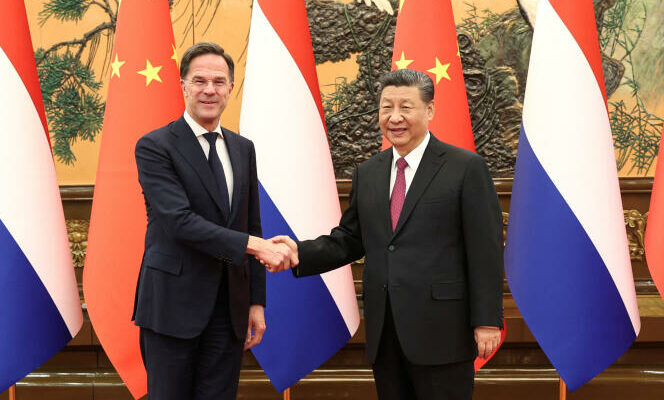The tone is up to the challenge. “No force can hinder the pace of China’s technological progress”, warned Chinese President Xi Jinping on Wednesday, March 27, to the outgoing Dutch Prime Minister, Mark Rutte, who was visiting Beijing. The Netherlands finds itself at the heart of the battle between the United States and China over the production of state-of-the-art electronic chips. America is deploying all its influence to prevent its main strategic competitor from catching up in this crucial area for the production of the most advanced smartphones, electric vehicles or complex weapons systems.
Much of this race is being played out in the suburbs of Eindhoven, in the southeast of the Netherlands, where ASML is headquartered. This company is the only one in the world capable of producing machines that engrave the finest integrated circuits, today down to 3 nanometers (nm). Under pressure from Washington and due to regulations adopted in 2019, the group has never delivered these machines engraving with “extreme ultraviolet” light to China, but supplies them to the foundries of the Taiwanese giant TSMC and the South Korean Samsung .
On the other hand, it sold its mid-range machines, of the previous generation, “deep ultraviolet”, to Chinese customers, in particular SMIC, a crucial supplier to the smartphone and telephone network giant Huawei, to whom the Taiwanese champions can no longer sell any electronic chips, again due to American pressure.
“National security before economic interests”
At the request of Washington, the Netherlands has also blocked, since 1er January, the supply of mid-range machines to China. The American administration intervened to stop last minute deliveries of Chinese orders, which saw a jump before the entry into force of the sales ban, while China did everything to buy as much equipment as possible .
Ahead of this ban, the Chinese market became, in 2023, the second, after Taiwan and before South Korea, for ASML, the most important European company in the technology sector. It made 6.4 billion euros in sales there, 30% of its turnover – a share which doubled compared to 2022.
This position is not consistent with the findings of Dutch intelligence, which, in its annual risk assessment, in August 2023, considered that China represents “the greatest threat to economic security” of the Kingdom. Mr. Rutte himself, the resigning head of government, cannot distance himself from American interests: he is the United States’ favorite candidate to take the post of secretary general of the North Atlantic Treaty Organization. A sign of Sino-American tensions over technology, China has reportedly introduced new rules asking its administrations not to equip themselves with computers and servers using AMD and Intel processors.
You have 41.52% of this article left to read. The rest is reserved for subscribers.
